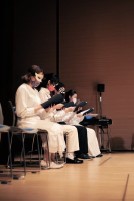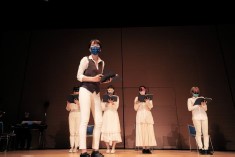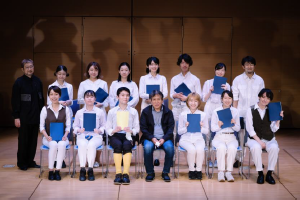- News
- Performance report : Shakespeare reading performance project “Twelfth Night, or What You Will”
Performance report : Shakespeare reading performance project “Twelfth Night, or What You Will”

- Posted
- Tue, 01 Mar 2022
* The recorded performance with English subtitle is now open to the public!
Please click here for the movies.
 On September 16, 2021, a stage reading performance was given at the Azusa Ono Memorial Hall. The script was the Shakespearean comedy Twelfth Night, or What You Will, and the actors were all current students of our university. The performance was sponsored by the Faculty of Letters, Arts and Sciences, Waseda University, and co-sponsored by the Global Japanese Studies Model Unit of the Waseda University Top Global University Project and the Waseda University Cultural Affairs Division. Due to Covid-19 control measures, however, the stage reading was performed without an audience. Instead, it was recorded on video, and the recording was made available online for one month from September 22 to those who submitted a request for viewing.
On September 16, 2021, a stage reading performance was given at the Azusa Ono Memorial Hall. The script was the Shakespearean comedy Twelfth Night, or What You Will, and the actors were all current students of our university. The performance was sponsored by the Faculty of Letters, Arts and Sciences, Waseda University, and co-sponsored by the Global Japanese Studies Model Unit of the Waseda University Top Global University Project and the Waseda University Cultural Affairs Division. Due to Covid-19 control measures, however, the stage reading was performed without an audience. Instead, it was recorded on video, and the recording was made available online for one month from September 22 to those who submitted a request for viewing.
This was the fifth time that this Shakespeare performance project was carried out. It started out in 2016, the 400th anniversary of Shakespeare’s death, as Waseda University’s first attempt to carry out a Shakespearean play (a stage reading performance; I, Hiromi Fuyuki, carried out the planning) performed only by Waseda students. Since then, performances have been given annually. This year, it was co-sponsored by the University’s Global Japanese Studies Model Unit, as it had a concurrent purpose of exploring and elucidating the relationship between script translation and performance.
All students of the University were invited in June to audition for this year’s roles. The auditions took place in July, and thirteen students were selected. These students rehearsed for eighteen days under the direction and instruction of Nobuhiro Nishikawa, director of the Bungakuza. They gave the performance on September 16 as scheduled. Twelfth Night, or What You Will is considered Shakespeare’s comedic masterpiece, but there were some aspects related to the interpretation of lines that required many discussions along the way between the director and others involved in the project. In addition, twice since the rehearsals began, we held Zoom meetings with the performing students to discuss and clarify matters related to the interpretation of the play and some differences between the original script and the translation. The students’ acting quickly gained depth in the days following these meetings, proving the benefits of examining interpretations involved in translated scripts.
 The performance took the form of a stage reading, in which the actors read the lines of their respective roles while seated on chairs placed across the stage. However, what set this performance apart from simply reading scripts was the way that the performers moved downstage and acted while reading their soliloquies and dialogues. This succeeded in creating an immersive effect comparable to watching a regular play. In addition, since Twelfth Night, or What You Will has the most music among Shakespeare’s plays, we included songs with live music performance by Ryo Ueda, who is a professional composer and musical performer. In this way, we were able to create a theater experience close to that of a regular play. In addition, thanks to a stage lighting expert who offered his help (Satoru Tsukamoto), it was possible to visually convey emotions behind the lines and inter-character relations that were difficult to express solely by reading and acting.
The performance took the form of a stage reading, in which the actors read the lines of their respective roles while seated on chairs placed across the stage. However, what set this performance apart from simply reading scripts was the way that the performers moved downstage and acted while reading their soliloquies and dialogues. This succeeded in creating an immersive effect comparable to watching a regular play. In addition, since Twelfth Night, or What You Will has the most music among Shakespeare’s plays, we included songs with live music performance by Ryo Ueda, who is a professional composer and musical performer. In this way, we were able to create a theater experience close to that of a regular play. In addition, thanks to a stage lighting expert who offered his help (Satoru Tsukamoto), it was possible to visually convey emotions behind the lines and inter-character relations that were difficult to express solely by reading and acting.
Although we were unable to see the audience’s reactions during the performance, we have requested its evaluation from the online viewers, and we plan to use the evaluation results to improve future projects. Although we have yet to receive these evaluations, it is possible to say from watching the performance in person that it surpassed what would normally be expected from a stage reading by students. In addition, the project was a meaningful one in that it attempted a form of theater performance under the Covid-19 pandemic circumstances.

This performance project was paired with the online symposium “Translation and Performance of Shakespeare” that was held on July 3. This symposium discussed problems related to the use of translated Shakespearean scripts in performances, and these matters were revisited and studied in the context of the preparations for the stage reading performance. Little by little through the process of the rehearsals, we were able to identify and consider matters such as effects and downsides of some performance-adapted omissions from Shakespeare’s text. We were also able to gain insights on the topic of translations suitable for performance. This process also turned out to be a fruitful learning opportunity for the students because, on some occasions, the students themselves pointed out differences they discovered between what was expressed or intended in the translated lines and the original text. As such, this project brought together a symposium on script translation and actual rehearsals using a translated script. It was a study and a demonstration of deepening the connection between textual theory and practice of the use of translated scripts in theater—a connection that has remained relatively uncultivated in Japan. We plan to attach English subtitles to the recording of this performance to disseminate it internationally, beginning with universities in the United Kingdom.
Finally, a comment on the students. The students who took part in this performance, many of whom had no prior experience in acting, put tremendous effort as a team into their rehearsals daily, actively figuring out ways on their own to make the dialogues work, to deliver lines, and to move on stage. Their tireless, dedicated efforts that made such a performance in such a short amount of time truly deserve praise. (Written by Hiromi Fuyuki)

- Tags
- Event Reports
